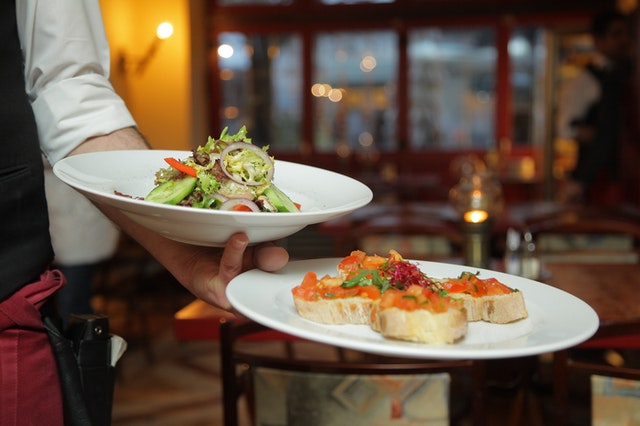Opening a Restaurant: 6 Risks and Solutions
 If you have a passion for good food, an understanding of exceptional hospitality, and business acumen, you may enjoy success as a restauranteur.
If you have a passion for good food, an understanding of exceptional hospitality, and business acumen, you may enjoy success as a restauranteur.
Before you run out to find a location, you must gain an in-depth understanding of the industry, its demands and the potential risks.
If you don’t, your new business might be forced to close before you’ve even started.
Prevent unnecessary mistakes and read about the six biggest risks when opening a restaurant and the solutions available.
1. Poor Cash Flow
If you would like to become a respected restauranteur, you must have a firm understanding of your company’s finances.
You will need to invest a considerable amount of money into a new restaurant to ensure it is attractive, functional, safe, and hygienic.
In addition to investing in a commercial kitchen, dining sets, and décor, you must generate enough revenue to cover various operational costs, such as:
- Energy bills
- Staff salaries
- Cleaning products
- Food and drink supplies
- Lease payments
- Marketing fees
The solution: Seek investment to improve your restaurant’s cash flow in its first year.
For example, you could apply for a traditional bank loan, small business loan, or secure funds from loved ones in return for equity in the business.
Alternatively, you could turn to crowdfunding platforms or pitch your restaurant idea to a private investor.
2. Food Storage Issues
Food storage can pose a major problem for most restaurants. As fresh produce is expensive, your chefs will need to stretch the produce throughout the day to maximize costs while satisfying customer demand.
Unfortunately, appliance issues or power outages can result in food spoiling, which will cost your business a substantial sum.
Not only might the business be forced to throw away expensive items, like steak or fish, but it may need to close its doors temporarily to resolve the issue.
The solution: Restaurants must invest in business insurance for financial coverage should the worst happen. You can choose from bar & restaurant insurance to general liability.
It will provide peace of mind that your business can bounce back from an appliance breakdown, power outage, or other issue.
3. Foodborne Illnesses
Restaurants have a legal and moral duty to protect customers from foodborne illnesses. Improper handling, expired food products, or unsafe storage methods can increase a customer’s risk of a foodborne illness.
Common foodborne illnesses include:
- Norovirus
- Salmonella
- Escherichia coli (E. coli)
- Staphylococcus aureus (Staph)
- Campylobacter
- Listeria
If a customer develops a foodborne illness, they may experience nausea, vomiting, diarrhea, and stomach cramps. In some cases, a foodborne illness may lead to hospitalization.
The solution: Every business owner must introduce and routinely assess food-handling policies and practices.
Every staff member must be held accountable for their actions regarding food safety, and action must be taken if they fail to follow policy to the letter, such as suspension or dismissal.
Also, restauranteurs must work closely with suppliers to ensure they follow strict food handling and storage procedures.
4. Low Sales
There is no guarantee your restaurant will be a success. You could have a stunning menu, the friendliest staff, and a sophisticated interior, but you might still fail to generate significant sales.
Many factors can influence your company’s success and cash flow, such as customer seasonality, local footfall, and nearby competition.
The solution: It is vital to research a location thoroughly before opening a new restaurant. If it will only be busy seasonally, it might be best to return to the drawing board.
Also, review the local competition to identify if you’re competing with bigger, more established rivals or restaurants offering the same cuisine.
5. Inexperience
A restauranteur’s inexperience will likely cause them to make small and big mistakes when opening their first venue.
While the mistakes might cause minor issues, there is no guarantee they will not interrupt business operations or affect its finances.
The solution: Remember, every restauranteur must start somewhere. Risk is inevitable in most sectors, especially hospitality, as there are many laws and regulations to follow and overheads and expectations to manage daily.
It may help to seek the advice and support of a mentor who has extensive experience in the industry. It will ensure you have someone to turn to for guidance or run ideas past.
6. Fire Safety
Fires can easily break out inside a restaurant, which is why you mustn’t underestimate their likelihood.
Common causes of restaurant fires include:
- Insufficient fire safety equipment
- Dirty ducts
- Electrical hazards
- Open flames
- Poor housekeeping
- Excess grease
- Flammable materials
Even a small fire in a vacant restaurant can cause significant damage to your business. Every restauranteur has a responsibility to improve fire safety to protect all employees, customers, and the public. You may also find that reopening becomes extremely difficult as your insurance costs go up.
The solution: Restaurant owners and employees must have an in-depth understanding of potential fire risks.
Also, they must ensure every staff member receives training on how to extinguish the different types of fires.

 Delicious
Delicious Digg
Digg StumbleUpon
StumbleUpon Propeller
Propeller Reddit
Reddit Magnoliacom
Magnoliacom Newsvine
Newsvine
Comments
Post new comment